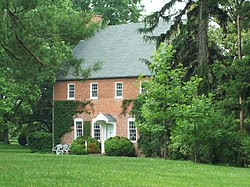She attended Mount St. Agnes and Goucher College in Baltimore, staying with her aunt, my great-grandmother, Louise Gwynn Scrivener. She graduated from the Medical College of George in 1927, the only woman in her class and just the second woman to graduate from the institution. After interning at the Central of Georgia Railway Hospital in Savannah, she accepted a position to do medical research at Johns Hopkins in Baltimore. But when she heard that the country doctor in southern Anne Arundel County had died, she took a bus to her future.
According to her account, the folks in rural Anne Arundel County were not very keen on a woman doctor. Her first patient was a dog that had been hit by a car. Fortunately, the dog thrived and so did the young doctor's practice.
According to her account, the folks in rural Anne Arundel County were not very keen on a woman doctor. Her first patient was a dog that had been hit by a car. Fortunately, the dog thrived and so did the young doctor's practice.
 |
| House Call ca. 1950 |
She made house calls on horseback, or by tractor when the roads were too muddy. Charging $1 for an office visit or $15 for delivery of a baby at home, she was often paid with bushels of oysters, dozens of eggs, or farm produce.
 |
| Obligation Farm 2010 |
Dr. Wilson's waiting room was open to both blacks and whites, with patients served in the order of arrival or according to the seriousness of their ailment, a situation somewhat unusual for the times, when the hospital in Annapolis refused to deliver African-American babies. According to her biographer, Therese Magnotti, "she never refused to go out on a call, no matter the time, no matter the weather. She never played favorites."
Dr. Wilson was denied admission into the Annapolis hospital and turned down when she first applied to the local medical society, but she later became chief of staff at what is now Anne Arundel Medical Center and president of its medical society. She established clinics to treat syphilis and enlisted the county's help to set up clinics for general medical and prenatal care. She diagnosed the first case of Rocky Mountain spotted fever in Maryland shortly after WWII. The disease was so unusual in the eastern states that doctors from Baltimore came to her office to observe.
 Dr. Emily Hammond Wilson, fondly referred to as "Doc," retired after 53 years in practice and died at the age of 103 on July 10, 2007, a beloved legend of Southern Maryland.
Dr. Emily Hammond Wilson, fondly referred to as "Doc," retired after 53 years in practice and died at the age of 103 on July 10, 2007, a beloved legend of Southern Maryland.References:
Magnotti, Therese. Doc: The Life of Emily Hammond Wilson. Published by the Shady Side Rural Heritage Society.
"Emily Hammond Wilson Walker MD (1994-2007)." MSA SC 3520-14731. Archives of Maryland (Biographical Series).

No comments:
Post a Comment